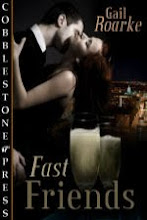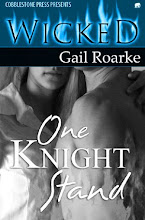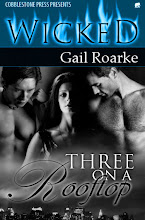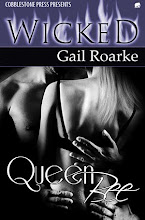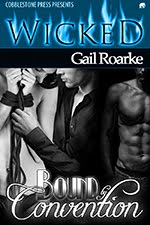Welcome to another weekly post in the How I Write series. This series of posts is the brainchild of Ansha Kotyk, who--along with the other participants, including Yours Truly--haunts the forums (registration required) of the Romance Divas website. You can go
here to find a list of all the participants with links to their individual blog posts. We'll each be posting on the same topic each Wednesday for the next two or three months--longer, if it goes well and we're having fun with it.
This week's topic is Getting the First Draft Completed, or Setting A Writing Schedule.
I've already mentioned this in previous posts, but my technique is pretty simple. I keep a kitchen timer on my desk. On writing days, I set it for sixty minutes. Once I've opened up a new file, or reopened a work in progress, I start the timer--and I start writing.
For the next sixty minutes I write. I am not allowed to delete anything I write, or edit it (other than to back up and fix a immediate typo or missing word). I am not allowed to stop and think. I must simply
write for an hour. When the timer rings, I take a brief break, then do it again. And again. As many times as I can in a day. The object is, as much as possible, to get out of my own way and let my creativity flow.
The less I allow my conscious mind (filled with rules gleaned from grade school, high school and college literature courses, books on writing, and so forth) to interfere, the better.My subconscious knows everything my conscious mind knows--and plenty more besides. It's also less constrained by rules and regulations. Once the first draft is done, I can go back and consciously apply the rules of fiction to improve the work.
But what I really want to talk about is numbers. I plan to write four novels in 2010. I've written two, and I have two more to go. (In fact, I just sent the second novel out to five publishers yesterday.) That's an ambitious goal, but not nearly as ambitious as it may sound. Your average novel tends to run between 70,000 and 120,000 words. There are exceptions. Some category romance novels clock in at 60,000 words, maybe less for some epublishers. But to the best of my knowledge, something much less than 70,000 words or longer 120,000 words is going to have trouble finding a home in New York, while 90,000 words is right in the sweet spot.
So. A manuscript page is roughly 250-300 words (double-spaced with one inch margins). Let's go with 250 words as the baseline. If you can write--not
type, mind you, but
write--reasonably fast, you can produce a manuscript page (250 words) every fifteen minutes. If you're slow, it might take you an hour.
If you write 250 words a day, every day, for a year, that's [250 x 365] = 91,250 words--or an average novel. That's a novel a year for
between fifteen minutes and an hour a day. (That doesn't include any revisions you'll do, but bear with me.*) Think you can squeeze out fifteen minutes of writing time every day? You could write a novel in a year.
Say you can produce 1,000 words a day (in an hour if you're fast, four hours if you're not). That's 365,000 words in a year--or
four 90,000 words novels. But that's too much work, you say. You want to take weekends off. And have a two week vacation after laboring over a hot word processor for between one and four hours a day. There are 52 weeks in a year. Strike two for vacations. That leaves fifty weeks. Five days a week x 50 weeks is 250 working days per year. At 1,000 words a day, that's still 250,000 words. That's 2.7 novels. Bump your writing up to 1200 words a day and you're producing
three 90,000 word novels a year.
Let's say you can afford to spend the time to write an average of 3,000 words a day, (either because you're being supported by a spouse** or you're spending your evenings writing after a day at the office). If you write five days a week, that's [250 days x 3,000 words] = 780,000 words in a year***, or
eight and a half 90,000 words novels. And you're still getting weekends off. (Now do you see how Nora Roberts, for instance, can publish so many books so fast? If she considers writing her day job--and she does--and spends hours writing every day, the words pile up very quickly.)
I'm only trying to write four novels this year. I'm an absolute slacker compared to Nora Roberts. She's not just a better, far more experienced writer, she's also a demon when it comes to productivity. Practice makes perfect, and boy does she get a
lot of practice. We could all learn from her example.
As you can see, setting a writing schedule is mostly a matter of discipline. The numbers don't lie. If you can apply yourself, there's no reason why you can't produce a novel in a reasonable length of time--by which I mean, a year at most. The faster you can write and the more time you can devote to your writing, the shorter the time needed to finish a novel. So I'll be writing two more novels this year and getting them all out to publishers. And then four more next year, and the year after that. Maybe they'll sell, maybe they won't. But all that practice will be teaching me to write more effectively, and eventually they
will start to sell.
Next week: Motivation--how to keep slogging away when your enthusiasm/confidence/muse deserts you.
*If you're spending only fifteen minutes to an hour a day on producing new words, I think you can find time to edit during the day as well.
**Who no doubt expects (or at least hopes) to be kept in the manner to which he intends to become accustomed once you become a rich and famous novelist, as in my case.
***If, as John D. MacDonald famously said, you have to write a million words of crap to get to the good stuff, that puts you three-quarters of the way there in ONE YEAR. Two if you dawdle.





